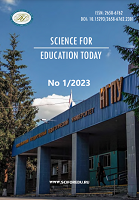Специфические особенности самоидентификации обучающегося в сравнительно-сопоставительном контексте анализа социокультурных характеристик общества
Specific features of student's self-identification in the comparative context of analysing socio-cultural characteristics of the society
Author(s): Valentina V. Barkova, Anton A. Semchenko, Aleksey Viktorovich Savchenkov, Natalya Vladimirovna MamylinaSubject(s): School education, State/Government and Education, Social Theory, Sociology of Culture, Sociology of Education, Identity of Collectives
Published by: Новосибирский государственный педагогический университет
Keywords: Self-identity; Self-identity crisis; Student Self-identification; Professional education; Social reality; Socio-cultural characteristics;
Summary/Abstract: Introduction. The article presents a comparative theorized review of the specific characteristics of students’ self-identification as main stakeholders of education, adapted to the conditions of megacultural challenges of social reality. Interest in the problem of student self-identity is determined by modern discussions about human identity, the specifics of its self-expression and existence in a rapidly and sometimes unpredictably changing social reality. The aim of the article is to identify the specific characteristics of the student's self-identification in the comparative context of analyzing socio-cultural characteristics of the society. Materials and Methods. The methodological basis of the study was sociocultural and systemic approaches. The authors used the principles of flexible rationality in building theorized constructs of the phenomenon of self-identity. The theory of ideal types (M. Veber) has the methodological value of the study, which makes it possible to navigate in the variety of manifestations of self-identification. The authors used the following research methods: a comparative historical method, deductive and chronological methods, generalization and analysis. Results. The authors have identified and analyzed specific features of students’ self-identification in the comparative context of the socio-cultural characteristics of modern society. It was revealed that students’ self-identification is influenced by a range of economic, geopolitical, digital and pandemicrelated factors as well as communicative deviations, which can be subjective, objective, rational or irrational. In the course of this work the authors discovered that modern culture is perceived as a mosaic, rhizome, fragmentary-lipoid formation, in the semantic space of which the student is functioning (crisis of self-identification). The authors substantiate the idea that in philosophical discourse, the historical and cultural system of modern education contributes to the formation of an individual focused on observing rather than thinking. Thus, there is a strong need for rethinking the basic universals of professional education system, including self-identity construct (professional development, worldview, values, meanings, goals and aspirations). The authors highlight the essential problems of the phenomenon of self-identity as a complex selfevolving system and outline the patterns of organization of a student's meaningful life orientations in the space-time continuum of history and professional culture. Conclusions. The authors conclude about specific characteristics of students’ self-identification in the comparative context of analyzing socio-cultural characteristics of the society. The main content of student's self-identity is summarized with an emphasis on the harmony of interaction of the components of self-consciousness in certain cultural and historical situations, i.e. on the formation of the ability to solve professional problems with the correlation of one's own image of "I" with the fundamental moral values of the era, country and personal choice.
Journal: Science for Education Today
- Issue Year: 13/2023
- Issue No: 1
- Page Range: 48-64
- Page Count: 17
- Language: Russian

